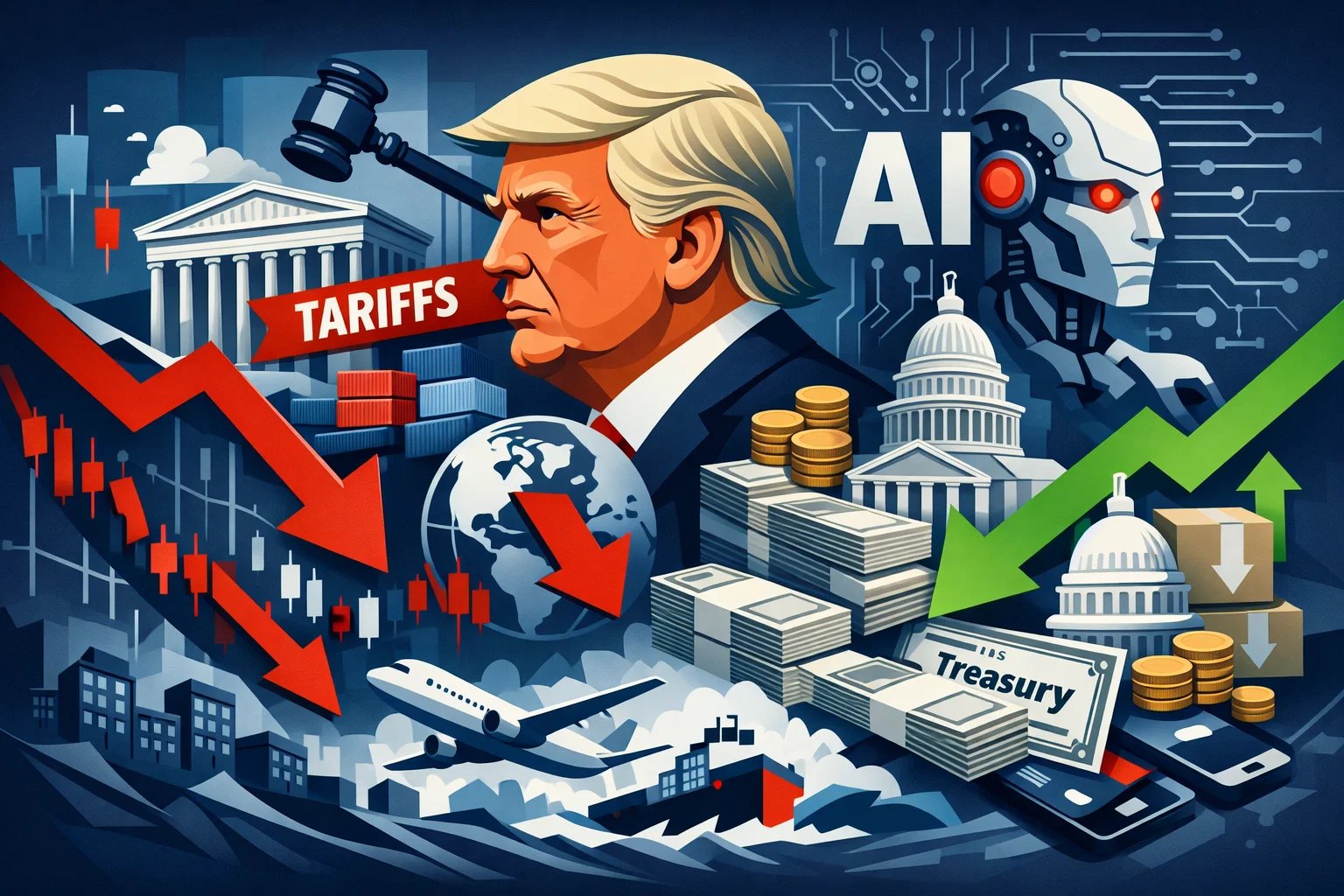
Market’s Week in Review
August 11-August 15, 2025
Short-Term ETF Price Targets
ETF | Short-Term Target |
|---|---|
SPY | $630 |
QQQ | $564 |
Week’s Market Performance
Index | Current Level | Percent Change: Week | Percent Change: Year-to-Date |
|---|---|---|---|
S&P 500 | 6,449.80 | +1.20% | +9.66% |
NASDAQ 100 | 23,712.07 | +0.79% | +12.85% |
VIX | 15.13 | -6.89% | -12.64% |
10-Year Treasury Yield | 4.32% | +0.75% | -5.64% |
Gold | $3,339.15 | -0.11% | +27.24% |
Oil | $63.13 | -1.30% | -12.07% |
Market News
Buffett’s $1.6 Billion UnitedHealth Bet Signals Renewed Faith in Troubled Health Sector
Warren Buffett’s Berkshire Hathaway recently purchased 5.04 million shares of UnitedHealth Group Inc., valued at $1.57 billion as of June 30, signaling confidence in the company despite a tumultuous year. UnitedHealth’s stock had plunged 40% in Q2 following a surprise jump in medical costs, increased government scrutiny and investigations, leadership changes, and the withdrawal of full-year financial guidance. Nevertheless, Buffett, known for buying “high-quality companies that look like they are damaged goods,” made the move as shares hit multi-year lows, resulting in a sharp 12% one-day rebound to $304.01—making UnitedHealth the S&P 500’s best performer on that day.
The article highlights how Berkshire’s investment, labelled by JonesTrading strategist Mike O’Rourke as a “classic Buffett move,” inspired a sector-wide rally, with major managed-care peers Centene, Elevance, and Molina also posting impressive gains. UnitedHealth, a Dow 30 member with a 2.91% dividend yield, appealed to Buffett’s preference for blue-chip dividend payers in industries he understands, given Berkshire’s extensive insurance holdings. Analysts note that UnitedHealth’s price-to-earnings ratio is now significantly below its five-year average, and the health sector overall trades at a steep discount. With healthcare hiring booming despite general economic slowdowns, Buffett’s move is seen as a sign that long-term value remains in the sector, although experts warn of continued volatility and potential negative headlines ahead.
Senate Democrats Urge Trump to Reverse Deal on Advanced AI Chip Sales to China
A group of six prominent Senate Democrats has called on President Donald Trump to reconsider his recent decision to allow U.S. tech giants Nvidia and Advanced Micro Devices (AMD) to sell advanced artificial intelligence chips to China. In an open letter, Senators Chuck Schumer, Mark Warner, Jack Reed, Jeanne Shaheen, Christopher Coons, and Elizabeth Warren warned that the arrangement, which grants export licenses in exchange for 15% of chip sale revenue, could endanger U.S. national security. The senators argued the deal compromises America’s technological edge and may strengthen China’s military capabilities, specifically mentioning Nvidia’s H20 and AMD’s MI308 chips. Nvidia countered these claims, stating their products would not enhance military power and that export bans ultimately hurt U.S. interests.
The letter comes amid growing concerns over U.S.-China tech competition and follows a Bloomberg report that Chinese authorities are actively discouraging domestic companies from purchasing Nvidia and AMD chips. ByteDance, Alibaba, and Tencent have reportedly been ordered to pause chip purchases pending a national security review. The senators requested a detailed response from the Trump administration about the Nvidia and AMD deal and any other similar arrangements by August 22. In response to the letter, Trump spokesperson Kush Desai criticized the Democrats, asserting they had previously ignored national security risks under the prior administration. The debate highlights ongoing tensions regarding AI technology export policies and the balance between economic interests and national security priorities.
Employee Share Sale Could Push OpenAI to Record $500 Billion Private Valuation
OpenAI is negotiating a deal allowing current and former employees to sell up to $6 billion in shares, a move that would value the company at $500 billion, up from $300 billion earlier this year. The list of potential buyers includes major investment firms such as SoftBank Group, Thrive Capital, and Dragoneer Investment Group. This secondary share sale comes alongside a separate $40 billion funding round led by SoftBank, with $8.3 billion already secured and another $22.5 billion expected by year’s end. The dual-track fundraising approach lets OpenAI attract new capital while offering staff a chance to cash out some equity, all without going public.
The share sale coincides with explosive revenue and user growth for the San Francisco-based AI company. OpenAI doubled revenue in the first seven months of 2025, pushing its annual run rate to $12 billion, and it anticipates reaching $20 billion by year’s end. ChatGPT remains a central driver, now nearing 700 million weekly active users. By enabling employees to profit from the company’s soaring value, OpenAI aims to retain top talent as competition for AI experts intensifies, particularly from rivals like Meta. If finalized, the transaction would place OpenAI among the world’s most valuable private firms, surpassing SpaceX’s estimated $400 billion valuation and signaling persistent demand in the artificial intelligence sector.
Tariff Impact Muted: New Studies Reveal U.S. Imports and Loopholes Have Blunted Inflation Surge
Despite the highest tariffs in nearly a century, U.S. inflation has not spiked as many economists anticipated. New research from Barclays indicates that actual tariffs paid by importers are lower than previously estimated, with a weighted-average rate of about 9% in May—significantly below headline figures—due largely to widespread exemptions and shifts in buying patterns away from high-tariff sources like China. While former President Trump claims tariffs have not caused inflation and he also calls for changes at Goldman Sachs over their forecasts, data from the Penn Wharton Budget Model shows $58.5 billion in tariff revenue and notes that, although prices of certain imports such as furniture have increased, overall inflation has not risen as dramatically as feared.
This muted effect is attributed not only to tariff exemptions on key goods like pharmaceuticals, electronics, and imports from Canada and Mexico but also to anticipatory stockpiling by companies aiming to avoid upcoming duties. Both Barclays and JPMorgan economists suggest that the effective inflationary impact of tariffs has been further softened by importers sourcing goods from nations with lower levies or domestic producers. However, as loopholes close and more firms—including importers like Randy Carr’s World Emblem—prepare to pass costs onto consumers, economists warn the real economic effects of tariffs could intensify in the months ahead. As inventories shrink and exemptions phase out, price increases may become more widespread, with Barclays forecasting tariff rates could rise to 15% or higher.
AI Startup Perplexity Proposes $34.5 Billion Acquisition of Google’s Chrome Amid Antitrust Pressure
Artificial intelligence startup Perplexity AI has made an unsolicited bid to acquire Google’s Chrome browser for $34.5 billion, a move backed by several venture investors, according to CNBC. This offer arrives just months after the U.S. Department of Justice (DOJ) prevailed in an antitrust case against Google, with the DOJ urging the company to divest Chrome to address its alleged monopoly in internet search. Google, which has not publicly responded to the proposal, faces increased regulatory scrutiny, while The Wall Street Journal was the first to report on Perplexity’s bold offer.
Perplexity, recognized for its AI-powered search engine and the recently launched Comet browser, has previously been approached by Meta for potential acquisition discussions, though no agreement was reached. The company’s purchase bid comes on the heels of its attempted merger with TikTok earlier this year, a deal that has not materialized. The DOJ argues that requiring Google to divest Chrome would open the market to more competition, with a court filing stating: “To remedy these harms, the [Initial Proposed Final Judgment] requires Google to divest Chrome, which will permanently stop Google’s control of this critical search access point.”
Editor’s Chart of the Day

This chart highlights Monster Beverage Corporation (MNST), a leading developer and marketer of energy drinks and alternative beverages with iconic brands like Monster Energy, Reign, and NOS. The company primarily focuses on product innovation and global brand building—leaning on partnerships, particularly with Coca-Cola, for worldwide distribution, while outsourcing its manufacturing to optimize agility and profitability.
Despite persistent challenges weighing down the broader consumer staples sector, MNST has consistently eclipsed many industry peers over the last twelve months. Recently, the stock has maintained levels notably above its 20-day, 50-day, and 200-day moving averages, which are key measures of both short- and longer-term momentum. What stands out is MNST’s resilience after its earnings-driven gap-up, with the stock showcasing exceptional relative strength as the broader sector struggled. Even during sector-wide weakness, MNST repeatedly found support around the critical $58 mark, where institutional buying emerged to reinforce this level and avert breakdowns, continuing to offer upside potential. As a result, Monster's twelve-month performance now ranks in the sector’s top quartile — a remarkable achievement amid ongoing inflationary pressures and consumer constraint issues facing staples at large.
Management remains decidedly upbeat, targeting a robust 7.7% revenue increase for 2025, alongside a projected 28.6% earnings surge, underscoring an ability to execute at a high level regardless of external headwinds. Should consumer staples retake market leadership, MNST stands out as a prime momentum candidate, with its consistent operational execution positioning it as one of the more compelling opportunities within the sector.
Major Earnings
Palo Alto Networks (PANW) – August 18, After Market Close
Financial Trends: Palo Alto expects fiscal 2025 EPS of $1.76, marking 17.3% growth from $1.50 in fiscal 2024, with fiscal 2026 estimates targeting further 16.5% growth to $2.05 per share.
Strategic Initiatives: The company's aggressive "platformization" strategy drives customers to consolidate security tools, with 1,250 platform deals across top 5,000 customers and multi-platform customers growing over 50% year-over-year.
Key Metrics: Analysts will focus on remaining performance obligations (RPO), next-generation security annual recurring revenue (NGS ARR), and progress on the company's three core platforms: Network Security, Cloud Security, and Security Operations.
Progress: PANW secured over 90 new platformization deals last quarter, bringing total large deals ($10M+) up 52% year-over-year to 32 accounts, demonstrating strong momentum in enterprise consolidation.
Focus Areas: Management will highlight AI-driven SIAM SASE solutions adoption, FedRAMP approvals for government sector expansion, and progress on Cortex XSIAM platform integration.
Risks Potential: Rising operational expenses (up 12% year-over-year) and margin pressures from aggressive platform discounting could weigh on profitability despite strong growth.
Concerns: Product gross margins at 78.4% fell short of expectations, while platformization discounting may continue pressuring margins as the company prioritizes market share gains.
Market Trends: Strong demand for AI-powered cybersecurity solutions and cloud migration accelerates enterprise security spending, particularly benefiting platform providers in the $475 billion cybersecurity market.
The Home Depot (HD) – August 19, Before Market Open
Financial Trends: Analysts project fiscal 2025 EPS to decline approximately 3% from 2024's $14.91 to around $14.50, while revenue growth targets 2.8% with comparable sales up 1.0%.
Strategic Initiatives: The SRS Distribution acquisition strategy continues with the pending $5.5 billion GMS purchase, creating a 1,200-location specialty trade network serving professional contractors.
Key Metrics: Investors will monitor comparable sales growth, big-ticket transactions (over $1,000), Pro segment performance, and progress on the "One Home Depot" omnichannel integration.
Progress: Home Depot completed the $18.25 billion SRS acquisition in 2024, expanding its addressable market by $50 billion to approximately $1 trillion, while opening 13 new stores in fiscal 2025.
Focus Areas: Management will discuss spring project momentum, Pro customer growth following SRS integration, and progress on supply chain investments including four new distribution centers for big-and-bulky products.
Risks Potential: High interest rates continue dampening big-ticket discretionary projects like kitchen and bath remodels, while tariff pressures and labor cost inflation threaten margin expansion.
Concerns: Big-ticket comparable transactions grew only 0.3% year-over-year in Q1, reflecting consumer reluctance to finance large home improvement projects in the current rate environment.
Market Trends: Aging housing stock supports maintenance demand, but elevated interest rates and economic uncertainty limit major renovation spending, creating headwinds for higher-margin discretionary categories.
Walmart Inc. (WMT) – August 21, Before Market Open
Financial Trends: Analysts expect fiscal 2026 EPS guidance of $2.50-$2.60, representing growth from fiscal 2025's $2.34, with Q2 2026 projections targeting $0.67 EPS on $174 billion revenue.
Strategic Initiatives: Walmart's six-pillar strategy emphasizes AI-driven automation, with next-generation fulfillment centers cutting unit costs by 20% while e-commerce reaches profitable 20%+ growth rates.
Key Metrics: Key performance indicators include U.S. comparable sales growth, e-commerce penetration (currently 18% of revenue), Walmart+ membership growth, and advertising revenue expansion.
Progress: The retailer achieved 22% e-commerce growth in Q1 2026 with profitable margins, while expanding same-day delivery to 93% of households through 4,600 store-fulfillment locations.
Focus Areas: Management will update on supply chain automation progress (65% of stores served by high-tech distribution centers), Walmart Connect advertising growth (+31% year-over-year), and international expansion.
Risks Potential: Tariff exposure threatens pricing strategy sustainability, while competitive pressure from Amazon in grocery and e-commerce segments could compress margins despite automation gains.
Concerns: Net income declined to $4.49 billion from $5.10 billion year-over-year in Q1 2026, raising questions about expense management amid aggressive automation investments.
Market Trends: Consumer price sensitivity drives traffic to value retailers like Walmart, while AI automation and same-day delivery capabilities position the company advantageously against traditional grocery competitors.
Meet Evan Buenger

Evan Buenger, Editor of the Bull and Bear Brief
From a young age, Evan was fascinated by the stock market. At just 11 years old, he received a Wall Street Journal subscription for his birthday, sparking a lifelong passion for investing. Evan spent his formative years studying the strategies and philosophies of legendary investors like Paul Tudor Jones, Stanley Druckenmiller, and George Soros, absorbing their wisdom and developing his own unique approach to the markets.
As Evan's knowledge grew, he began to incorporate the time-tested, technically-based strategies of trading legends like William O'Neil and Richard Wyckoff into his own investment framework. By borrowing elements from each and rigorously testing them in real-time, Evan created a powerful conglomerate strategy that encompasses fundamentals, technicals, and macroeconomics.
Today, Evan is a professional trader and was a top contender in the 2020 US Investing Championship. His extraordinary performance, with a 141.8% return, is a testament to his studious background, well-informed approach, and unwavering dedication to his craft.
At the core of Evan's strategy is identifying stocks that benefit from sector trends and rotation. By combining fundamental analysis with a focus on relative strength and advanced technical analysis techniques, Evan is able to identify the stocks that are most likely to move higher or lower over the intermediate term.
While he keeps a close eye on macroeconomic trends, his willingness to adapt to changing market conditions, as well as his developed ability to know when to and not to act in a fast-moving market, is what sets him apart. Evan has consistently demonstrated his ability to navigate even the most challenging investment environments. His impressive track record and unique perspective make him a valuable voice in the world of finance, and he is thrilled to have the opportunity to share his insights and expertise with subscribers of the Bull and Bear Brief.
Subscribe to Stock Portfolio Recommendations Newsletter to read the rest.
Become a paying subscriber of the Bull and Bear Brief: Stock Portfolio Recommendations Newsletter to get access to this post and other subscriber-only content.
Upgrade to Stock Portfolio Recommendations NewsletterA subscription gets you:
- Expert-curated stock trades delivered weekly to strategically build your wealth-generating portfolio
- Real-time position management with timely alerts on existing holdings—ensuring you capture profits and minimize losses with precision timing
- Monthly Q&A where we address paid subscriber questions, examine real-world scenarios, and discuss current market conditions
- Regular reviews of both successful and unsuccessful trade recommendations, analyzing what worked, what didn't, and the lessons we can extract


























